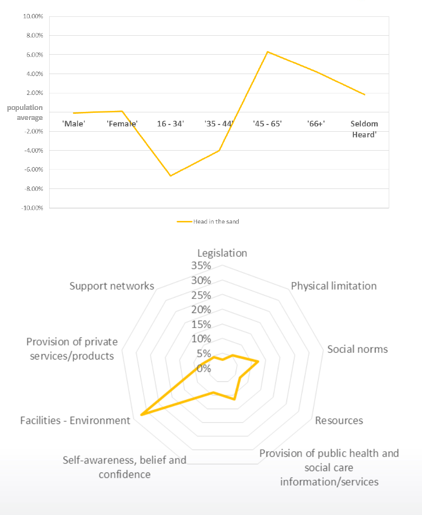18% of our people have their “head in the sand”.
There’s no gender bias, yet there are more over 45’s in this population and slightly more “seldom heard” people than average.

When discussing what hinders or helps people to take charge of their health? Their conversation reveals four priorities:
- Facilities and the physical environment
- Social norms in the circles they mix
- Self-awareness, belief and confidence
- Provision of public health and social care information and services
We can create a “typical narrative” from their ideas, comments and votes in the online workshop too.
I know that I am unhealthy but improve my health is not really a priority, in addition to my own health issues…
Facilities – environment
The facilities that I have access to are not always set up to support me to take charge of my health. Leisure facilities are designed for people who are confident and healthy with little consideration for those of us who are embarrassed of our bodies or those who have special needs. I find employers do not provide enough support for employees with special needs or chronic conditions. On top of all of this our streets are getting nosier and busier, and the weather is often awful so it difficult to have a calm and healthy life.
“It’s hideous and embarrassing being watched as you walk from the changing room into the pool…I avoid swimming so I don’t have to do the ‘walk of shame’ in a far from perfect ‘bikini body.’”
“For many of us with autism spectrum disorders, these places are sensory hell.”
“This world has become so noisy…you find that people coming home after a night out are so inconsiderate and shout and scream, there’s no peace and quiet. Also worry keeps you awake, and there’s so much to worry about.”
Social norms
My friends and family accept it when people like me work long hours are constantly on our phone or computer, or drink and smoke a little too much in social gatherings in order to have fun.
“It’s become the norm, [drinking is] the first thing people think about now when organising a get together.”
“We’re not sleeping because all adults are working long hours”
“We are told that the more money we earn the more important we are, the more fulfilled our lives will be.”
Provision of public health and social care information/services
I’ve given up on finding information on how to take charge of my health. I’m sure the information is out there but it is not created for people like me. Whether it is recipes or advice on what to drink and eat, the information is often too technical to understand. Also there is no information on exercise classes that accommodate my specific health conditions.
“People have difficulties finding information about exercise groups they could join if they have health issues such as obesity, COPD, heart problems, or with Osteo-arthritis/osteoporosis etc.”
“Limited literacy can be a barrier to good nutrition as people can’t access the information about how to cook healthier food.”
“It is all well and good giving us a standard to upkeep in trying to be a responsible drinker. But putting it into a value as units I think is not helpful. It is not that complicated but is not a very personal approach. It is detached and does not seem to resonate with me.”
Self-awareness, belief and confidence
I have one life and I want to enjoy it, some people might frown upon my so called unhealthy habits but I am not bothered. I often feel a bit embarrassed about the way I look, my low levels of confidence are maybe part of the reason why I don’t exercise.
“lift people out of short-term living so that they can see they have a future to take charge of”
“many parents buy cigs for their kids and allow them to smoke at home.”
“smoking is not seen as an addiction. The majority of people think I can’t quit it’s too hard, therefore I won’t even try.”
“You end up having to put in more than 100% of the effort and willpower that is available to you, as you have to deal with the current mess *and* do something about the future.”
Interestingly, solutions offered by this population include:
> Employers to introduce and advocate policies that support the people with special needs (autistic people, young disabled people, etc.)
> Set up community groups such as game challenges, cooking classes, chat forums etc.
> Install outdoor exercise machines in public parks
> Improve cycling routes
> Create a comprehensive directory for exercise groups for people who have health issues – available in medical centres, libraries etc.
> Create an easy to read cookery book which uses more pictures instead of words